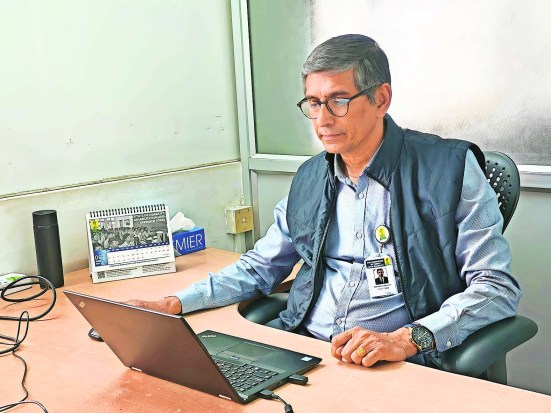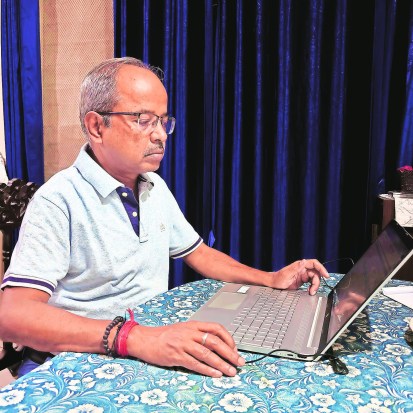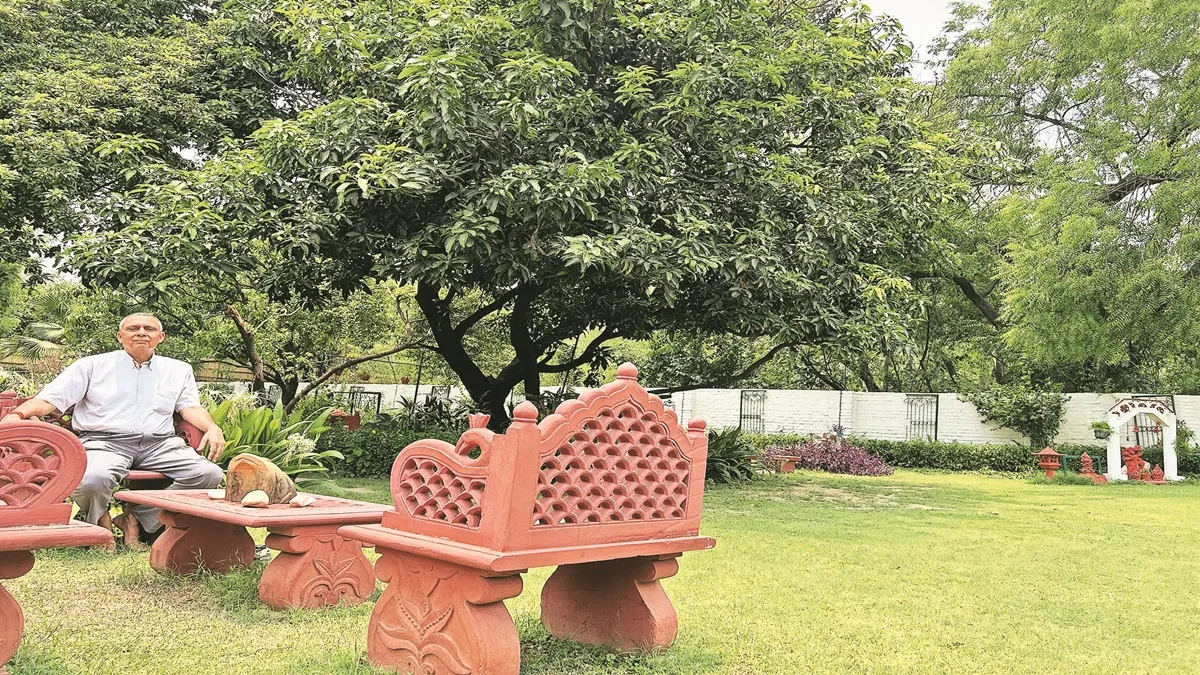By Sugandha Mukherjee
When 74-year-old Chandan Chatterjee packed up his government-issued flat in New Delhi and moved to Shyamnagar, a sleepy riverside neighbourhood outside Kolkata, he imagined a gentle rhythm to his days—slow walks on the banks of Hooghly, newspapers, maybe a quiet cup of tea at dusk. The quiet was deliberate. It was a salve, an answer to years of deadlines and policy papers. But it didn’t take long for that silence to turn inert.
“I thought I’d volunteer,” he says. “So I joined a community club. But it was just politics and talk. I wanted to do something useful with my time,” he adds.
He isn’t alone in this sentiment. Across India, the idea of retirement is being recast. Where once it signalled a retreat into stillness and constant phone scrolls, it now offers something closer to a personal reinvention—less rocking chair, more start-up tables. Platforms, such as RetirementJobs.in and WisdomCircle, are drawing thousands of retirees seeking part-time work, board roles, and advisory gigs. Airbnb is seeing a rise in senior hosts turning into superhosts.
Life expectancy has expanded compared to previous decades, and with it, the emotional and economic need to remain relevant. Job portals such as RetirementJobs.in report that eight in 10 retirees actively seek work post-retirement. The reasons vary from practical to philosophical. Some want to keep affording their expensive health insurance; others just want to avoid turning into the uncle who yells at the watchman.
“In our portal, we have people from lower-ranking officials to retired IAS officers, with immense knowledge on things which most corporates want. The enthusiasm for the initiative gave us the push we needed,” says Manoj Deebak, founder and CEO of RetirementJobs.in, adding: “We’ve received overwhelmingly positive feedback from retirees who are now engaged and satisfied with their second innings.”
As per the Sample Registration System (SRS)-based abridged life tables 2017-2021, expectation of life at birth for India has been estimated at 69.8 years for the period 2017-21, exhibiting a decrease of 0.2 years from 2016-20. The expectation of life at age 60 is 18.1 years for 2017-21, with 17.2 years for males and 19.1 years for females. During the 1990-1994 period, the life expectancy in urban areas was 65.4 years, whereas in 2017-21, the number shot up to 72.9 years. For many, that’s too much time to sit idle and too little to waste.
But living longer isn’t the same as living better. A retired government employee gets Rs 9,000 per month at a minimum, rarely enough for urban living. Private-sector retirees often fare worse, with little to no pension safety net. A recent study by Grant Thornton Bharat on India’s pension landscape highlighted the inadequate preparedness of most Indians for post-retirement life, particularly in the private sector, with a significant 56% of respondents planning to retire between the ages of 55 and 65 years. The survey found that 83% of participants rely predominantly on three retirement products—Employees’ Pension Fund (EPF), gratuity, and National Pension System (NPS), and 55% of respondents expect a monthly pension exceeding Rs 1 lakh. However, only 11% believe their investments are enough to meet expectations. Despite schemes like EPF, NPS, and Atal Pension Yojana, the existing systems are not sufficient to fully secure post-retirement support, pushing many to explore other options.
Turning entrepreneurs
Digital reinvention is taking root in unexpected corners. Many retirees are turning to tech to fund their post-retirement lifestyle, both financially and mentally. Content creators like Nisha Madhulika, 65, one of the highest-paid female YouTubers in the country, and financial advisors like PR Sundar, 61, who has over 1.21 million followers, are redefining the possibilities for senior creators.
Others have found fulfilment through platforms like Airbnb.
Tarun Malik (62), a senior Airbnb superhost in New Delhi, rents out a spacious three-bedroom apartment on the first floor of a villa, surrounded by a 2,000-sq-mt greenspace of manicured lawns, fruit trees, a water fountain, garden swings, and the occasional peacock. Guests can book the whole apartment or a part /room thereof; the property is fitted with smart locks, high-speed Wi-Fi, and full-time caretaker-cooks.
“I’m keeping alive the legacy of my late parents,” says Malik. He’s used Airbnb income to expand his staff, host family gatherings on off-days, and give himself “a challenging post-retirement occupation” that doesn’t eclipse his hobbies. “Since most guests realise I am a senior citizen they respectfully address me as ‘Sir’. Other than that, they do not give me any concession and have similar service expectations from me as they would from a younger host,” he adds.
For Ragini Singh (72), it began long before platforms and keywords. In 2007, with her children away in boarding school or prepping for overseas education, she moved into a new flat in New Delhi with three spare bedrooms. Hosting came naturally.
“I’ve been in the travel trade since 1982, so I understood what jetlagged guests needed. Home-cooked meals, warm welcomes, a soft landing before their India tour began,” she recalls. Being a single parent helped her stay pragmatic and upbeat. Slowly, she began saving pocket money for her children’s future. In 2016, Singh shifted to a new building, continuing to host across two 3BHK flats. By 2017, she became a co-host on Airbnb and was given carte blanche to redesign the interiors. “That freedom was a huge boost,” she says. “It worked beautifully until Covid-19 hit.” What’s sustained her is the joy of tailoring experiences. “I love fine-tuning their wish lists, whether it’s shopping, meals, or even wedding planning,” she says. “The aha moment is when someone notices the welcome kit… every hosting is a huge learning experience.”
Second careers
Not all retirees are monetising homes. Some are leveraging decades of professional experience in more conventional ways, but with a shift in pace and perspective. Retired engineers consult for infrastructure firms. Ex-bankers advise microfinance institutions. Educators mentor ed-tech platforms. Much of this is being channelled through platforms like WisdomCircle, an age-tech start-up that matches organisations with seasoned professionals.
“We’ve seen strong traction across industries where domain expertise and institutional knowledge are critical, such as infrastructure, energy, manufacturing, healthcare, social impact, BFSI (banking, financial services, insurance) and education,” says Niharika Kabra, marketing lead at WisdomCircle. In less than a year, the platform has partnered with over 1,200 companies and facilitated placements across healthcare, social impact, education and small business sectors. While digital skills remain a common gap, most recruiters are willing to overlook it.
“There’s a perception that seasoned professionals face digital or technological gaps, our experience has shown a more nuanced reality… we have seen use cases where they have been successfully placed in digital transformation and business transformation roles precisely because of their ability to guide complex change initiatives,” Kabra adds. The most common gaps tend to lie in the use of newer productivity tools or platforms but these are typically quick to bridge with light onboarding or coaching.
Manish Khandelwal, 56, who now is a commercial leader at Battery Foil-Hindalco Industries, found WisdomCircle via Instagram. “Within a month of registration, I was placed at a major Indian MNC with great future prospects,” he says. Another retiree, Ramachandran RS, 63, who spent decades in technology, now works as chief technology officer at The Association of People with Disability in Bengaluru. “The role came through WisdomCircle,” he says. “It is a boon for people like me who are in search of a purpose post their retirement,” he adds.
 Oplus_16777216
Oplus_16777216
The remote or hybrid work also enables businesses to access seasoned professionals without geographical limitations and allows professionals to contribute on their own terms.
“Most retirees prefer jobs near their hometowns, especially to stay close to family,” says Deebak. “But if an outstation opportunity excites them, they go for it. Salaries aren’t always high, but engagement is the key motivator. They want to feel useful,” he adds.
Some jobs are paid per project or on a contract basis; others offer modest but regular compensation. Start-ups and mid-sized firms are beginning to recognise the value of hiring seniors for their judgment, patience, and people skills.
Chatterjee, who worked for the Centre for Development of Advanced Computing (C-DAC), could not look for work. A retired officer of a Central Service Group ‘A’ cannot accept any commercial employment before the expiry of two years from the date of his retirement. “Unless you get an approval, which is a long process,” he says. “I was offered a consultancy position by the local body of C-DAC which I happily accepted later,” says Chatterjee. But, geography matters. He laid conditions that he would come twice a week and for 3-4 hours since travelling between Shyamnagar and Kolkata is cumbersome.
These days, however, he has stepped away from formal work. “Now I’d rather travel around the world,” he adds, smiling.
No more couch potatoes
In Bengaluru, Ashish K Ghosal, 62, had barely finished his farewell speech when his phone began to ring again. Thanks to his 36-years of experience and reach, he was given a four-year contract extension as a consultant at a large private IT firm almost immediately. “It allowed me to contribute meaningfully without being on the sidelines. Everyone in my circle wants to work,” he says. “Not for the money. Just to be of use.”

In private sector, retirement is at 58, whereas government employees retire between the ages of 60-65 years. But as Ghosal points out, that boundary feels increasingly arbitrary in a knowledge economy. “We tend to think life is a dream and people will support us,” he says. “But once you step out of the building, except for one or two people, everyone forgets you.”
He’s now in talks with a university to design mentorship programmes for accounting professionals. “Some can’t work due to health,” he says. “But no one wants to be a couch potato.”
For others, post-retirement life is not about professional reinvention, but personal evolution. Ramesh Chandra Bhatt retired as a sub-inspector in Uttarakhand after four decades of service. Now living in Rudrapur, the 64-year-old devotes his time to community service, helping those in distress, raising awareness around social issues, and deepening his spiritual study.
“I want to use my remaining years to serve both my family and society,” he says. “Especially the underprivileged and those in need,” he adds. Bhatt doesn’t work through platforms. He doesn’t earn. His “second innings” is about giving back, not in performance or metrics, but in presence.
He represents a quieter strand of this post-retirement shift: not driven by external validation, but by a desire to remain morally and emotionally engaged.
Risks and reckoning
Digital access has made many of these opportunities possible, from Airbnb listings to online mentorship. But it has also opened the door to exploitation. “There’s still a risk of falling prey to scam jobs online, especially those that ask for money or private information,” warns Deebak. “That’s why we vet every employer before they’re allowed to post on our platform,” he adds.
And not just male applicants. While there’s historically been a higher volume of male applicants due to systemic workforce participation gaps in earlier decades, there is a steady rise in applications from senior women professionals. “Organisations are increasingly recognising the value of gender diversity at leadership and advisory levels, and we expect this balance to continue to improve,” says Kabra.
The trend is still nascent. But the numbers suggest momentum. By 2036, over 230 million Indians will be over the age of 60, according to a report Population Projections for India and States. This demography is better educated, more mobile, and increasingly tech-savvy. But it is also vulnerable: financially uncertain, and navigating the emotional terrain of ageing in a Gen-Z culture.
Whether for financial security, mental stimulation, or human connection, one thing is clear though—for a growing number of Indians, retirement is no longer about slowing down. It’s about showing up, and on their own terms.

